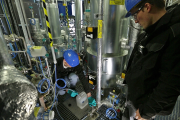 Sunfire, working in the field of high-temperature fuel cells and reversible electrolysers, has announced that the company succeeded in producing synthetic diesel from air, water and green electrical energy for the first time. The cleantech company has built a demonstration rig for power-to-liquids, which was inaugurated by the German Minister of Education and Research, Johanna Wanka in November 2014. Recently, the plant reached its full operating condition and now produces synthetic diesel fuel with excellent eco-friendly properties.
Sunfire, working in the field of high-temperature fuel cells and reversible electrolysers, has announced that the company succeeded in producing synthetic diesel from air, water and green electrical energy for the first time. The cleantech company has built a demonstration rig for power-to-liquids, which was inaugurated by the German Minister of Education and Research, Johanna Wanka in November 2014. Recently, the plant reached its full operating condition and now produces synthetic diesel fuel with excellent eco-friendly properties.
On behalf of the project partner Audi, an independent laboratory confirmed that the outstanding characteristics of the fuel are superior to the properties of fossil fuel. sunfire, one of the top 100 companies in clean technologies worldwide, is supported by several corporate venture capital companies and funds, including Bilfinger Venture Capital, Total Ventures, KfW and Electranova Capital, a venture capital funds financed by Allianz and EDF.
Today, a revolutionary step for the German energy transition has been made in Berlin, Germany: sunfire filled the Audi A8, used as official car by the Federal Minister of Education and Research Johanna Wanka, with a few litres of the synthetic fuel. The Ministry had supported the development of the manufacturing plant in Dresden. The new fuel is a synthetic diesel-distillate based on “Blue Crude” (hydrocarbons). In the following video, sunfire shows how the first litres were abstracted: http://bit.ly/sunfire_video2.
Audi, German car manufacturer and project partner of sunfire, exposed the synthetic diesel to laboratory tests, with the result that the fuel was approved. The analysis shows that its properties are superior to fossil fuel. The synthetic sunfire diesel does not contain any sulphur or fossil oil and thus is particularly eco-friendly. sunfire-CTO Christian von Olshausen says: “The engine runs quieter and fewer pollutants are being created”. The cetane number is very high (roughly 70) and ensures a cleaner and better combustion as a blending component for conventional diesel fuel.
The power-to-liquids technology reaches system efficiencies of about 70%. The centrepiece of the three-stage procedure is the reversible electrolysis (rSOC) based on the Solid Oxide Power Core. The rSOC generates hydrogen with an efficiency of approximately 90%. The main advantage comes to the fore when electricity prices rise to a level that makes hydrogen production unprofitable: After a short turnaround interval, the system can be switched to fuel cell mode and used to convert hydrogen reserves or any another fuel back into power and heat.
The scalable power-to-liquids demonstration rig is able to produce up to 160 l (42.2 gallons) of „Blue Crude“ per day. In the next step a bigger plant should follow. “If we get the first sales order, we will be ready to commercialize our technology”, sunfire-CTO Christian von Olshausen says.
As developer and producer of reversible electrolysis and fuel cells, sunfire is one of the two finalists in the category „Science & Energy“ of the EDF Pulse Award. The innovation award of the French energy supplier EDF will be determined via online voting until May 3rd. Participation is possible and much appreciated under the following link: http://bit.ly/sunfire-edf-pulse


